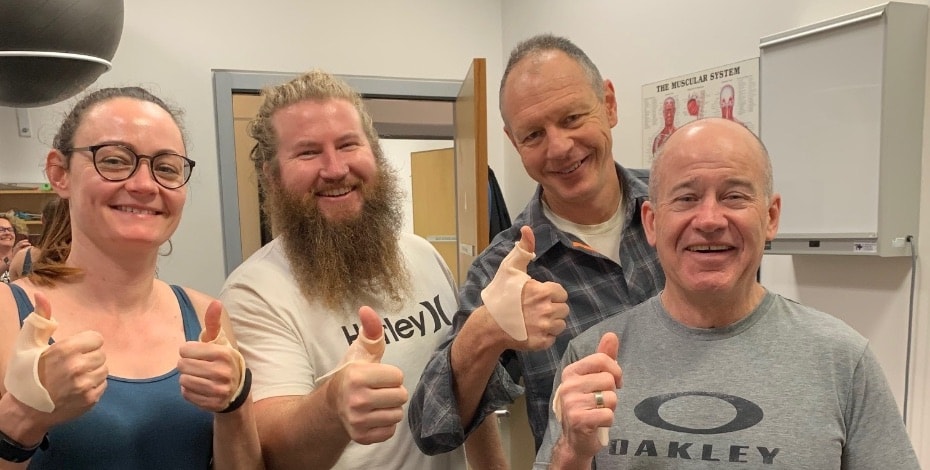
Physio training for Antarctic-bound medicos

When the next group of expeditioners explore the Antarctic, one of the most remote places on Earth, they’ll be arriving with the knowledge that a group of select physiotherapists has been helping ensure they will receive the best in medical care.
The physiotherapists from Tasmanian clinics Allcare Physiotherapy, Bodytech Physio and BodySystem Physio are part of a structured pre-departure medical training program that upskills doctors who will be stationed at Australia’s three Antarctic stations, and its sub- Antarctic station on Macquarie Island.
They educate and train the Antarctic-bound doctors in musculoskeletal assessment and management for the upper and lower limbs and spine during a three-day intensive hands-on program in Hobart.
One medical practitioner is posted at each station, and is responsible for the care and wellbeing of all expeditioners, with the support of the division’s 24/7 telemedicine systems connecting them to expert help, when required. Training is also undertaken in laboratory techniques, radiography and radiology which supplements the doctor’s experience with the ability to manage an isolated practice and deal with any surgical, medical or dental emergency that might arise, as well as supervise other expedition personnel assisting with medical procedures.
In the physiotherapy sessions, doctors are shown how to assess an injury, then apply practical, hands-on treatment options, such as hand and finger splinting, massage and basic exercise prescription.
‘The doctors are not able to access physiotherapy services in Antarctica. They cannot be expected to have the musculoskeletal skills or knowledge of a physio,’ says APA Musculoskeletal Physiotherapist Fiona Hamilton, a director of BodySystem Physio, which has been delivering training to the Australian Antarctic Division Polar Medicine Unit for more than a decade. ‘They all go to different stations and have to be jack-of-all-trades on everything that comes past them, which would be challenging. What they want is the really practical stuff, so we give them some basic assessment and treatment strategies so they can get started in being able to recognise and clinically reason what may be going on when they are presented with an injury.’
Up to six doctors undertake the intensive course at a time, with some of those attending the September session preparing for a return visit to the polar region. ‘They all come from various backgrounds. One doctor, who also went last year, was grateful for revision of the hands- on knowledge, and others have said that it is good to be trained in doing practical things other than investigation and handing out medication.’
Anticipated injuries could include finger, hand and wrist ligament injuries, dislocated shoulders and knees caused from slipping on ice. ‘We do practical techniques such as shoulder taping and teaching how to make basic thermoplastic splints, so they can do basic splinting for thumb injuries. And because they have limited communication with experts and access to resources, particularly in terms of imaging, I am keen to teach that they can get a working diagnosis without relying on it.’
Each doctor is supplied with a resource pack that includes information handouts and links to online videos that demonstrate taping techniques.
‘Having physiotherapists educating the doctors is an opportunity for us to demonstrate that we know quite a lot about the musculoskeletal system,’ Fiona says. ‘It is a real strength to clinically reason and not rely on scans and X-rays, and it is good to have the opportunity to
go through this with the doctors and make them realise there are lots of things other than investigations that might be more relevant to establishing a diagnosis and, therefore, a management strategy.’
Ongoing participation in the program has also piqued Fiona’s curiosity about the icy region. ‘I think it would be an interesting trip, and it would be so good to have a physiotherapist down there. Until then, we share our knowledge and experience through these training sessions.’
© Copyright 2024 by Australian Physiotherapy Association. All rights reserved.





